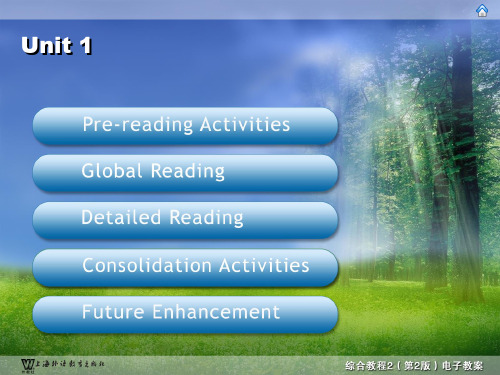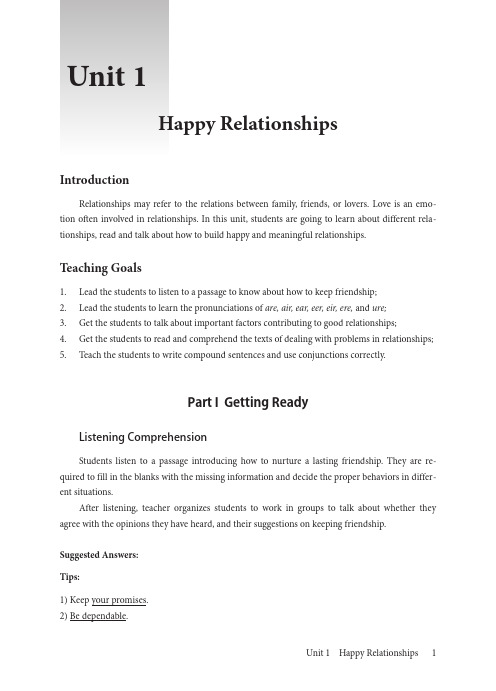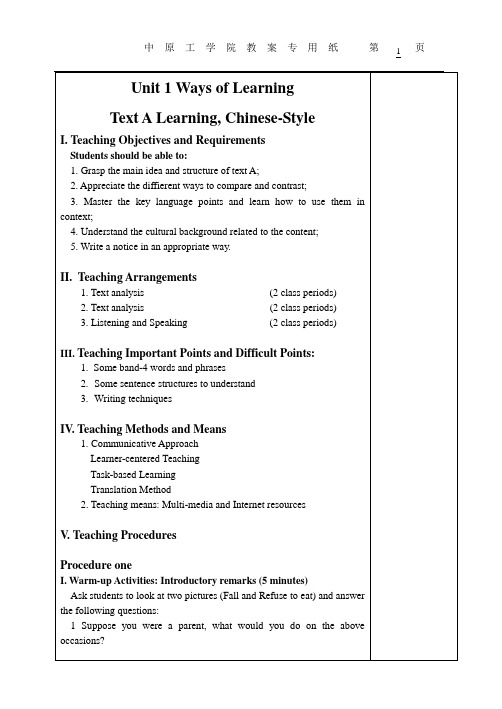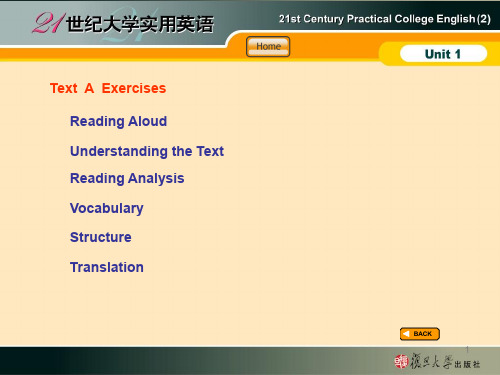世纪英语综合教程2第八版第一单元课件(一)
新世纪综合英语第二册unit1

Detailed Analysis
• Paragraph 1:
• Adam Mayblum used to enjoy watching as storms lashed the windows of his office: You think that’s power? Mayblum would scoff. I’m on the 87th floor of the World Trade Center. That’s power. The drawstrings on his window shades would appear to sway slightly, but it was illusion. Although they were 1,040 feet in the sky, The WTC was quite steady.
2. Draw out a picture to show how Mayblum tried to escape from the disaster.
• Mayblum: 87th floor —85th (he bolted down 2 flights—para 8 ) —87th (went back upstairs) —78th floor (para 9) —53rd floor (heavyset man: Victor)
• Judge whether the following sentences are parallel or not. If not, how can you change them into parallel structures?
•
---Senator Tom Harkin
• 2. Look at the above pictures, what do these pictures remind you of the meaning of “disaster”?
新世纪英语专业综合教程第二册Unit1

Detailed reading
8 Sparks bit at Mayblum’s ankles as he raced for the stairs. He bolted down two flights before realizing that his trading partner, Hong Zhu, had been left behind. He went back upstairs, the whole area now filled with smoke and burning jet fuel. 9 There was no sign of Hong. Mayblum hurried down again and made it to the 78th floor, a transfer lobby where one set of elevators and stairs ended and another began. He saw a reassuring sight; Ramos had waded into the pandemonium to help panicked workers into a stairwell.
Detailed reading
24 The rumbles of the collapsing tower next door seemed to sap the heavyset man of his last gasps of energy. “I can’t do it anymore,” he said, sitting down. 25 Hong and Ramos tried to persuade him to continue. “You don’t have to move your legs!” Hong shouted. “Just move your butt. Let’s go!” But the man couldn’t go on. 26 A fireman ran up to them. Hong expected that he would join in to get the heavy man to move. Instead, the fireman turned to Hong. 27 “Who are you, screaming at him to get out?” the fireman shouted. “You get out!”
世纪实用英语综合教程2教学U8B2ppt课件

with the missing words;
C. Ask them to answer the questions about
the conversation;
PREV.
NEXT
UNIT 8
Time Contents
Plan
D. Tell them to look for the language used to asking for and giving reasons;
BACK
UNIT 8
Ⅰ. Objectives After studying this unit, the students are expected to be able to 1. master the basic language and skills necessary to ask for
Listening and Speaking
Plan
The teacher begins with the Preview to make sure that the students have a general idea of what this unit is all about. After that, the teacher activates listening and Speaking exercises as follows:
1) The Language for Asking For and Giving Reasons A. Give a brief lead-in talk on the
nature and uses of asking for and giving reasons;
B. Present the necessary language by
世纪应用英语综合教程(基础篇II)教师用书整套课件完整版PPT教学教程..

act like you’re perfect. If you know you’ve made a mistake, admit it instead of just
pretending that nothing is wrong, or worse — blaming it on someone else.
Teaching Goals
1.
Lead the students to listen to a passage to know about how to keep friendship;
2.
Lead the students to learn the pronunciations of are, air, ear, eer, eir, ere, and ure;
Conflict doesn’t always have to be negative (adj.
冲突并非总是坏事,也不一定会
消极的) or turn into a shouting match though. It can
演变成争吵。它可以成为更好更深
be a useful tool in getting to know yourself and others
and tell him or her that you’
re sorry.
2.
Be dependable. Your friend will need you for support, especially in hard times. It’s hard to
rely on a person who doesn’t behave in a trustworthy way. If you’re not sure you can do
(word完整版)综合教程 第二册 Unit1

2.Some sentencestructuresto understand
3.Writing techniques
.Teaching Methodsand Means
municative Approach
Learner-centered Teaching
(attacBiblioteka A to B; B be attached to A)
E.g. A price tag was attached to each article in the supermarket.
E.g.Do youattach much importance to(十分重视) what he says?
2. Appreciate the diffierent ways to compare and contrast;
3. Master the key language points and learn how to use them in context;
4. Understand the cultural background related to the content;
assist (Para.4)
v. (formal) help, support
(n. assistance, assistant)
Pattern: assist sb to do sth;
assist sb with sth;
assist sb in (doing) sth.
E.g. assist sb to fill in the forms
1 Group presentation (Group 1) (5 minutes)
新世纪大学英语综合课程2unit1-unit8listenandrespond听力原文

Unit 1 Living in Harmony[00:]Listen and Respond[00:]Smile[00:]I am a mother of three and have recently completed my college degree. [00:]The last project the professor assigned us to do was called “Smile.”[00:]The class was asked to go out and smile at three people and then write down their reaction.[00:]I am a very friendly person and always smile at everyone I meet and say “hello.”[00:]So I thought that it would be a piece of cake for me.[00:]Soon after we were assigned the project, my husband,[00:]the youngest son and I went out to the local McDonalds on a cold March morning.[00:]Just when we were standing in line, waiting to be served, [00:]I smelled a horrible “dirty body” smell, and there standing behind me were two poor homeless men.[01:]As I looked down at the shorter gentleman close to me, he was smiling. [01:]His beautiful sky blue eyes were searching for acceptance. [01:]He said, “Good day” as he counted the few coins he had. [01:]The second man was mentally retarded.[01:]The young lady at the counter asked the shorter man what they wanted. [01:]He said, “Just coffee for the two of us.”[01:]Obviously, it was all they could afford.[01:]To sit in the restaurant and warm up, they had to buy something —they just wanted to be warm.[01:]Then I was suddenly filled with sympathy.[01:]All eyes in the restaurant were set on me, judging my every action. [01:]I smiled and asked the young lady behind the counter to[01:]give me two more breakfast meals on a separate tray.[02:]I then walked to the table where the two men were sitting. [02:]I put the tray on the table and laid my hand on the blue-eyed gentleman’s cold hand.[02:]He looked up at me and said, “Thank you.”[02:]I leaned over and said, “Just help yourselves.”[02:]I started to cry when I walked away to join my husband and son. [02:]As I sat down, my husband smiled at me and held my hand for a moment. [02:]I returned to college, with this story in hand.[02:]I turned in “my project” and the professor was touched and read it to the whole class.[02:]The whole class was touched.[02:]I graduated with one of the biggest lessons I would ever learn —UNCONDITIONAL ACCEPTANCE.Unit 2 Optimism and Positive Thinking[00:]Listen and Respond[00:]Attitude Is Everything[00:]Michael was a natural optimist.[00:]He was always in a good mood, always up and always had something positive to say.[00:]If an employee was having a bad day,[00:]Michael was there telling the employee how to look on the positive side of the situation.[00:]Seeing his optimism really made me curious, so one day I went up to Michael[00:]and asked him, “I don’t get it.[00:]You can’t be positive all the time.[00:]How do you do it”[00:]Michael replied, “Each morning I wake up and say to myself: Mike, you have two choices today.[00:]You can choose to be in a good mood or you can choose to be in a bad mood.[00:]I choose to be in a good mood.[01:]Each time something bad happens, I can choose to be a victim or choose to learn from it.[01:]I choose to learn from it.[01:]Every time someone comes to me complaining, I can choose to accept the complaining[01:]or I can point out the positive side of life, I always choose the positive side of life.”[01:]“Yeah, right.[01:]But it isn’t that easy.”[01:]I said.[01:]“Yes, it is easy,” Michael said.[01:]“Life is all about choices.[01:]Every situation in life is a choice.[01:]You choose how you react to situations; you choose how people will affect your mood; you choose how you feel.[01:]The bottom line is: It’s your choice how you live your life.”[01:]From Michael I have learned that every day we have a choice to live fully.[01:]So I will choose to be an optimist.[01:]If I am an optimist I may feel better, enjoy life more, and maybe have more chances of success.Unit 3 The Road to Success[00:]Listen and Respond[00:]Follow Your Dream[00:]One day in a high school, a senior named Monty Roberts was asked to write[00:]a paper about what he wanted to be and do when he grew up. [00:]Monty Roberts was the son of a horse trainer.[00:]He loved horses.[00:]That night he wrote a seven-page paper describing his goal of someday owning a large horse ranch.[00:]He wrote about his dream in great detail and he even drew a picture of a 200-acre ranch.[00:]He put a great deal of his heart into the dream ranch[00:]and the next day he handed the paper in to his teacher.[00:]Two days later he received his paper back.[00:]He got a large red F for his paper.[01:]He went to ask the teacher why.[01:]The teacher said, “The dream is impossible for you.[01:]You have no money.[01:]Owning a horse ranch needs a lot of money.[01:]You have to buy the land, the house, and the machines for your ranch. [01:]There’s no way you could ever do it.”[01:]Then the teacher added, “If you will write this paper a gain [01:]with a more realistic goal, I will reconsider your grade.”[01:]The boy went home and thought about it long and hard.[01:]He asked his father what he should do.[01:]His father said, “Look, son, you have to make up your own mind on this.[01:]Ho wever, I think it is a very important decision for you.”[01:]Finally, after sitting with it for a week, the boy turned in the same paper, making no changes at all.[01:]He said to the teacher, “You can keep the F and I’ll keep my dream. [02:]I will follow my heart, no matter what happens.”[02:]Now years have passed.[02:]This young man’s dream has finally come true.[02:]He is the owner of a large horse ranch.Unit 4 Being Creative[0:]Listen and Respond[0:]Creativity Is the Essence of Life and Nature[0:]Creativity is the essence of life and nature.[0:]The world itself is in a constant act of creation, so we human beings should ask ourselves — Why,[0:]in such a creative world, do some people sometimes appear to be stupid, dull, and uncreative[0:]— Are people really dull[0:]Or are we all, in fact, creative[0:]To answer this, let’s look at a baby.[0:]The whole essence of a baby is creative —it is creative in learning to walk, talk, sing, and play.[0:]Just imagine, a child can create a world of its own imagination and play with it for hours.[0:]A scientist who creates a theory is just like that — it is a play of ideas within the mind.[1:]It is hard to stop creativity in a young child.[1:]You can’t make your child creative.[1:]It simply is creative.[1:]Then, how can our children be still more creative[1:]I would suggest that the first step is to allow ourselves to be creative.[1:]If we ourselves are creative, we can guide our children in a way that is free and unconditioned.[1:]We should give our children a free and safe surrounding for them to explore, make mistakes and create.[1:]If we know a better way to do things, we should guide or “help” the child.Unit 5 The Value of Life[0:]Listen and Respond[0:]Life is a Bottle of Rocks[0:]A philosophy professor stood before his class with some items on the desk in front of him.[0:]When the final student was seated, he picked up a large[0:]and empty glass bottle and filled it with rocks about 2 inches in diameter.[0:]He then asked the students if the jar was full.[0:]They agreed that it was.[0:]He then picked up a box of pebbles and added them to the jar, shaking it lightly.[0:]The pebbles, of course rolled into the open areas between the rocks. [0:]“Is this jar filled now”[0:]Yes, the students said.[0:]But then he picked up a bag of sand and poured it into bottle. [0:]The sand filled in everything else.[0:]Once more he asked if it was full and after some thinking they said that it was.[1:]The professor then took 2 cans of beer and poured the beer into the jar.[1:]The students laughed loudly.[1:]After the laughter stopped, the professor spoke again: “I want you to recognize that this jar represents your life.[1:]The rocks are the important things in your life, your family, your partner, your health,[1:]your children — things that would still remain even if everything else were lost, and your life would still be full.[1:]The pebbles are the other things that matter — like your job, your house, your car.[1:]The sand is everything else.[1:]The small stuff.[1:]If you put the sand into the jar first there is no room for the pebbles or the rocks.”[1:]“The same goes for your life.[1:]If you spend your life on small stuff, you will never have room for things that are important to you.[2:]Pay attention to things that are critical to your happiness: your family, your health.[2:]There will always be time to go to work, clean the house and so on. [2:]Take care of the rocks first — the things that really matter. [2:]Set your priorities.[2:]Th e else is just sand.”[2:]After the impact of what he said settled,[2:]one of the students raised his hand and inquired what the beer represented.[2:]“I am glad you asked.”[2:]He replied.[2:]“It just goes to prove that no matter how full your life may seem, [2:]there is always room for a couple of beers.”Unit 6 Learning to Work Together[0:]Listen and Respond[0:]Be a Team Player[0:]If you really wish to succeed in life, it is very important to be a team player.[0:]For example, in a basketball game, Michael Jordan is a great player, [0:]but he still has to cooperate well with his team members to win a game, [0:]because every member of his team has a very specific role[0:]and every member of the team is vital to the success of the team. [0:]If one player does not play well, the team will lose the game. [0:]Of course, the concept of teamwork applies to more than just sports. [0:]In the workplace and in school, working together is also an important element for success.[0:]In the workplace, it is important to be thought of as a team player, [0:]for no one person can build a railroad or manage an airline. [1:]In today’s world most companies are using team concepts to run their business.[1:]Success in college can also depend on teamwork.[1:]Lab work and group projects are just some of the experiences requiring good cooperation with others.[1:]Human beings are social creatures.[1:]Like it or not, we are all team players.Unit 7 Adversity[0:]Listen and Respond[0:]Carrots, Eggs and Coffee Beans[0:]A daughter complained to her father about her life and how things were so hard for her.[0:]She did not know how she was going to make it and wanted to give up. [0:]Her father, a cook, took her to the kitchen.[0:]He filled three pots with water and placed each on a high fire. [0:]When the water came to a boil, he placed carrots in one of them, [0:]eggs in the second pot, and coffee beans in the third.[0:]His daughter waited impatiently and wondered what he was doing. [0:]In about twenty minutes he took out the boiled carrots and eggs and placed them in two different bowls.[0:]Then he poured her a cup of coffee.[1:]He turned to his daughter, and asked her, “What do you see”[1:]“Carrots, eggs, and coffee,” she replied and asked, “What does it mean, Father”[1:]He explained that the carrots, eggs and coffee beans each had faced [1:]the same adversity, boiling water, but each reacted differently. [1:]The carrots went in strong and hard but came out softened and weak. [1:]The eggs had been weak.[1:]But after being boiled their inside became hardened.[1:]The coffee beans were unique, however.[1:]After they were boiled in the boiling water, they had made the water taste better.[1:]Then the father asked his daughter, “When adversity knocks on your door, how do you react[1:]When life isn’t turning out quite the way you expected, you have a choice to make.[1:]Which will you be — a carrot, an egg, or a coffee bean[2:]If you are like the coffee bean, when things are at their worst, [2:]you get better and make thi ngs better around you.”Unit 8 Human Behaviour[00:]Listen and Respond[00:]The Unexpected Rescue[00:]I was walking along a dark street late one evening when I heard screams coming from behind some bushes.[00:]Alarmed, I slowed down to listen, and realized that what I was [00:]hearing were the sounds of a hard fight and tearing of clothes. [00:]Only yards from where I stood, a woman was being attacked. [00:]Should I get involved[00:]I was frightened for my own safety and cursed myself for having suddenly decided to take a new way home.[00:]Shouldn’t I run to the nearest phone and call the police [00:]Although the thoughts in my head had only taken seconds, already the girl’s cries were growing weaker.[00:]I knew I had to act fast.[00:]How could I walk away from this[00:]No, I finally decided.[00:]I could not turn my back on the fate of this[01:]unknown woman even if it meant risking my own life.[01:]I am not a brave man, nor am I a strong man.[01:]I don’t know where I found the courage and physic al strength, [01:]but once I had finally decided to help the girl I seemed to have changed into another man.[01:]I ran behind the bushes and pulled the attacker off the woman. [01:]While struggling, we fell to the ground,[01:]where we wrestled for a few minutes until the attacker jumped up and escaped.[01:]Breathing hard, I approached the girl, who was sobbing behind a tree. [01:]In the darkness I could barely see her outline, but I could sense her trembling shock.[01:]Not wanting to frighten her further, I spoke to her from a distance. [01:]“It’s OK.”[01:]I comforted her.[01:]“The man ran away.[01:]You are safe now.”[01:]There was a long pause...[01:]I heard the words in amazement.[01:]“Daddy, is that you”[02:]And then, from behind the tree, stepped out my youngest daughter, Katherine.。
新世纪大学英语综合教程2-unit1

Zooming In: An Integrated English Course(Book II)Unit 1 Living in HarmonyText A: “I Forgive You”I Class Hours: 6II. Teaching Objectivescate students to be more virtuous and inclusive towards the society and people aroundthem.2.Grasp the key words, Phrases and structure.3.Master the skills of writing and reading in this unit.III. Teaching Focus1. Get Started2. Text Organization3. Skill learning in writing and reading4. Language points (key words, phrases and difficult sentences)5. Grammar Focus (Gerunds)6. Guided PracticeIV Class Hours Allotment1st period: Text-related information and warm-up questions.2nd period: Pre-reading activities (New words and Expressions).3rd period: Intensive studies of the text A (Language points).4th period: Intensive studies of the text A (Language points).5th period: Exercises (V ocabulary, word building, structure, translation, cloze and text B).6th period: Listening and speaking activities.V Class Procedures1. Get Started (Warm-up Activities)1). Questions for discussionA) Is it hard to forgive someone? Why or why not?B) Do you have the experience of being forgiven? What is it?C) How do you understand this sentence: We may not know how to forgive, and we may notwant to forgive; but the very fact that we say we are willing to forgive begins the healing practice.2). Background InformationThe Bible: The holy book of the Jewish and Christian religions. The Jewish Bible is made up of 39 parts that tell the story of God’s relationship with the Jewish people in ancient times. These 39 parts also form part of the Christian Bible and are called the Old Testament (旧约全书). The Christian Bible has another 27 parts called the New Testament, which tells the story of Jesus Christ.2. Text OrganizationPart I (para.1-3) Why forgiveness is necessary for human relationships and for your own health and sanity?Part II (para.4- 10)You should act immediately and deliberately to forgive others although it is difficult to do so. At the same time, you should look back on your own warts and be aware of your own flaws.Part III (11-15) Forgiving others can get a satisfying reaction. No matter how the person responds to your effort, you will feel happy once you try to forgive him or her.3. Skill learning in writing and readingThe whole article is arranged in a quite logical order.The author first emphasizes the importance of forgiveness: necessary for human relationships and for your own health and sanity; then, on this fact, he asks people to practice forgiveness immediately and meanwhile look back on their own warts and flaws; at last, he relates people’s happiness to forgiveness without considering the responses from the persons they forgive.4. Language PointsA) New words1) forgiveness: n. [U] when sb. forgives another personEg: She quickly admitted her guilt and asked for our forgiveness.CF: forgive & excuse 这两个动词均有“原谅”之意。
21世纪大学实用英语综合教程第二册第1单元PPT幻灯片

Part Ⅰ
Toபைடு நூலகம்ic
Misunderstandings may occur among native English speakers.
Paragraph 1 2
3
Supporting Details
A passenger wanted to tell the driver _th_a_t_t_h_e_re__w_a_s__a_b_u_m__i_n _th_e__re_s_t_ro_o_m__.
2. What can you do to avoid the serious consequences (后果) of misunderstandings caused by confusing words or expressions?
PREV.
BACK
4
Reading Analysis
Read Text A again and complete the following table.
and what had it turned into when it reached the driver? 5. What was the result of the wrong message? 6. Where did the man in Los Angeles want to go and where did he arrive? 7. What was the cause of his mistake?
BACK
2
Understanding the Text
Answer the following questions.
1. What is the text mainly about? 2. Why did the man with uncombed hair and dirty clothes head straight for
- 1、下载文档前请自行甄别文档内容的完整性,平台不提供额外的编辑、内容补充、找答案等附加服务。
- 2、"仅部分预览"的文档,不可在线预览部分如存在完整性等问题,可反馈申请退款(可完整预览的文档不适用该条件!)。
- 3、如文档侵犯您的权益,请联系客服反馈,我们会尽快为您处理(人工客服工作时间:9:00-18:30)。
世纪英语综合教程2第八版第一单元课件(一)
世纪英语综合教程2第八版第一单元课件
教学内容
•单元主题:旅行与娱乐
•词汇与短语:travel, accommodation, reservation, sightseeing, amusement park, tourist attraction,
adventure, explore, relax, entertain
•语法:过去进行时
教学准备
•教材:《世纪英语综合教程2第八版》
•课件模板
•学生手册及练习册
教学目标
•了解与旅行与娱乐相关的词汇与短语
•掌握过去进行时的用法与结构
•能够运用过去进行时描述旅行与娱乐活动
•培养学生的听说读写能力
设计说明
本课件旨在通过图文并茂的方式呈现教学内容,引发学生的兴趣与思考。
教学过程分为导入、呈现、操练、拓展和总结五个环节。
课件中穿插了多个互动环节,以激发学生的参与和思考,提高他们的学习效果。
同时,还设置了相关练习,以帮助学生巩固所学内容。
教学过程
导入
1.利用图片引出单元主题,激发学生对旅行与娱乐的关注。
2.提问学生,询问他们对旅行与娱乐的看法,激发他们的思考与表
达,准备引出本单元的教学内容。
呈现
1.通过图片和单词的呈现,向学生介绍本单元的相关词汇与短语。
2.提供示例句子,帮助学生理解与运用这些词汇与短语。
操练
1.分组讨论:学生根据提供的问题和素材,进行小组讨论,展示他
们对旅行与娱乐的态度和想法。
2.角色扮演:学生分配角色,结合课文中的对话,进行角色扮演,
练习口语表达能力。
拓展
1.引入过去进行时的概念和用法,通过示例句子让学生感受并理解
该时态。
2.通过图片和问题展开讨论,引导学生运用过去进行时来描述旅行
与娱乐活动。
总结
1.概括过去进行时的结构和用法。
2.提醒学生在以后的学习和实践中要运用所学内容。
课后反思
本节课的教学过程较为丰富,图文并茂的呈现方式引发了学生的
兴趣。
学生在讨论和角色扮演中积极参与,口语表达能力得到了锻炼。
然而,课件中的互动环节可能需要更加有趣和具体,以进一步激发学
生的学习热情。
同时,课后需要布置适当的练习作业,巩固学生所学
内容。
课件更新
根据课后反思,对于本节课的课件进行了更新和改进,以提升教
学效果和学生的学习体验。
导入
•添加了一段视频片段,展示了不同的旅行和娱乐场所,引起学生的兴趣和好奇心。
呈现
•重新设计了词汇与短语的呈现方式,通过图片和词汇表的对应,使学生能够更直观地理解和记忆。
同时,提供了更多的例句和真实情境,以帮助学生更好地理解和运用这些词汇与短语。
操练
•添加了小组游戏环节,学生根据图片进行词汇与短语的配对,以增加学生的互动和合作学习。
•进一步提高了角色扮演的难度,让学生充分展示他们的语言表达能力。
拓展
•引入了过去进行时的更多例句和练习,帮助学生更好地理解和掌握该时态。
•引入了一个小游戏,学生需要根据给定的情境和提示使用过去进行时进行造句,以加深对该时态的理解和运用。
通过对课件的更新和改进,增加了更多的互动环节和真实情境,激发了学生的学习兴趣和参与度。
学生通过视频片段、小组游戏和角色扮演等形式得到了充分的锻炼和练习,巩固了所学内容。
在总结环节中,学生也能更好地理解和运用过去进行时。
在今后的教学中,可以根据学生的反馈和学习情况进行进一步的调整和改进,以提升教学效果和学生的学习体验。
